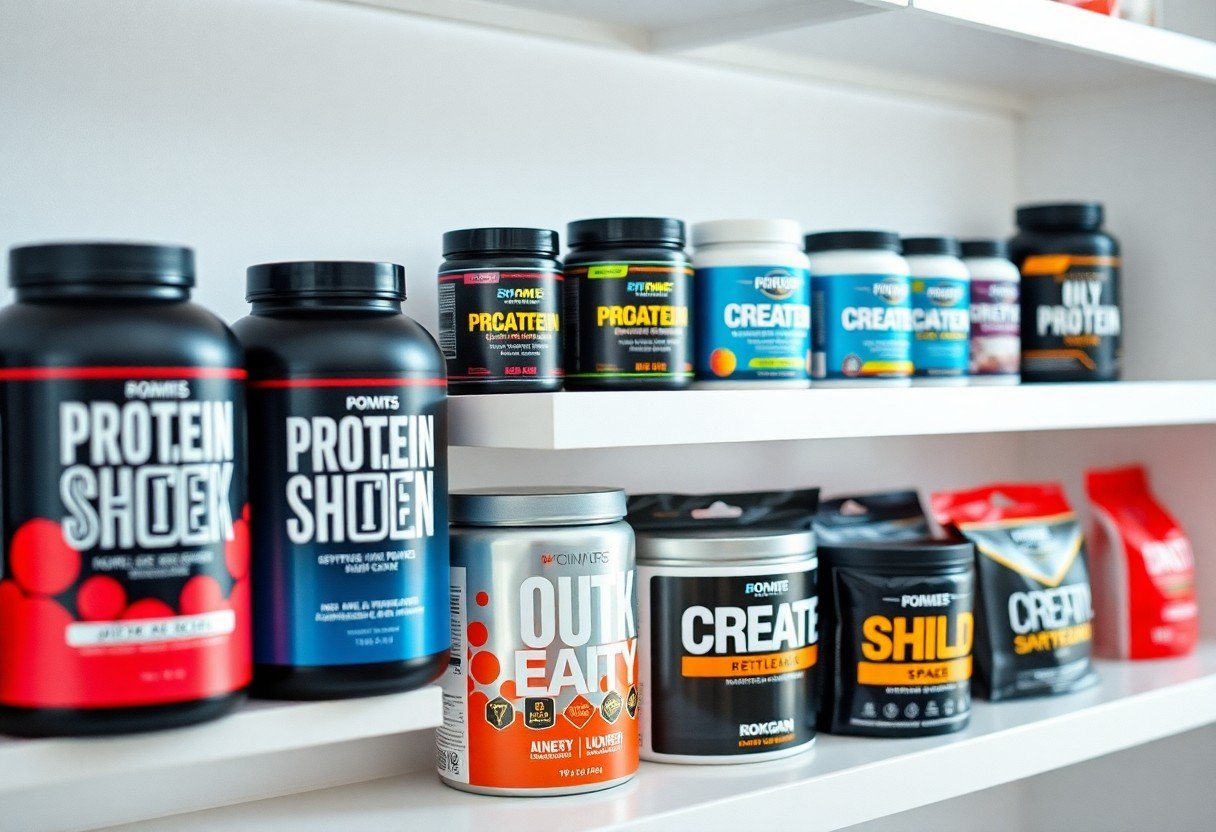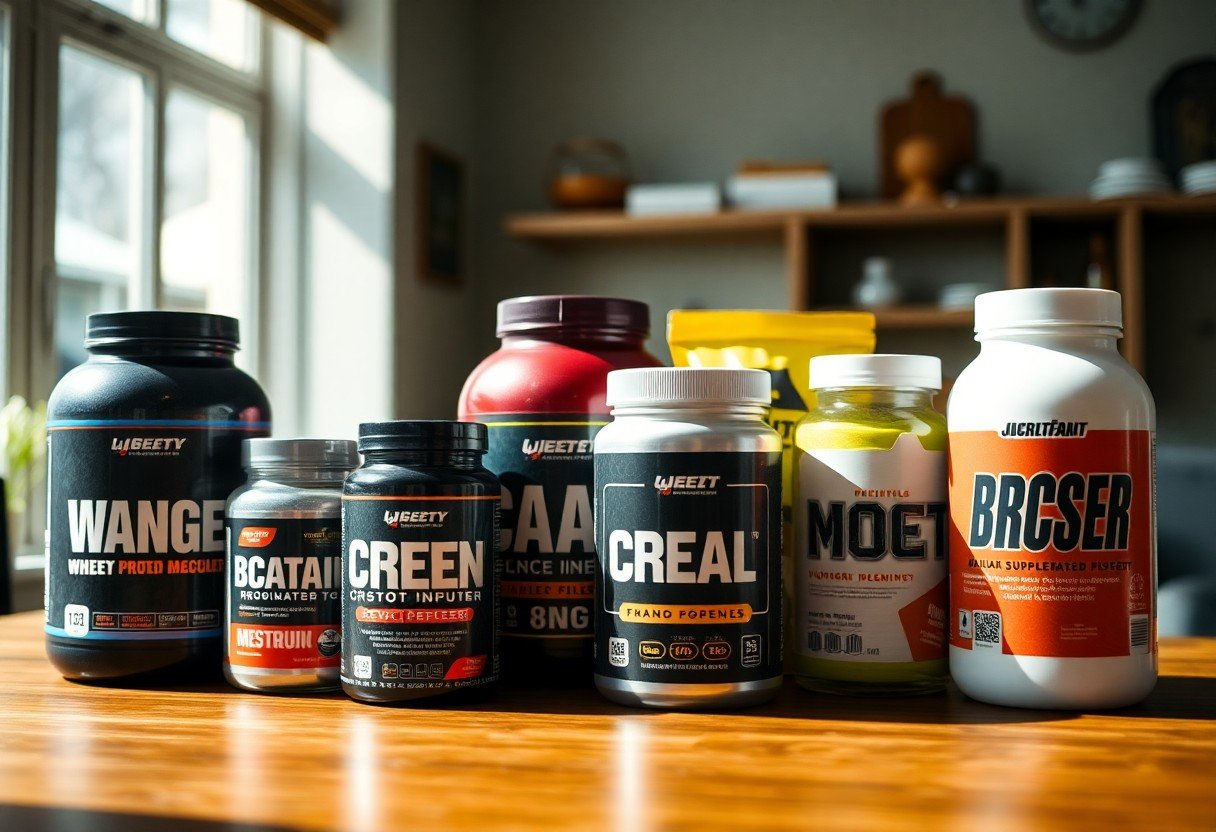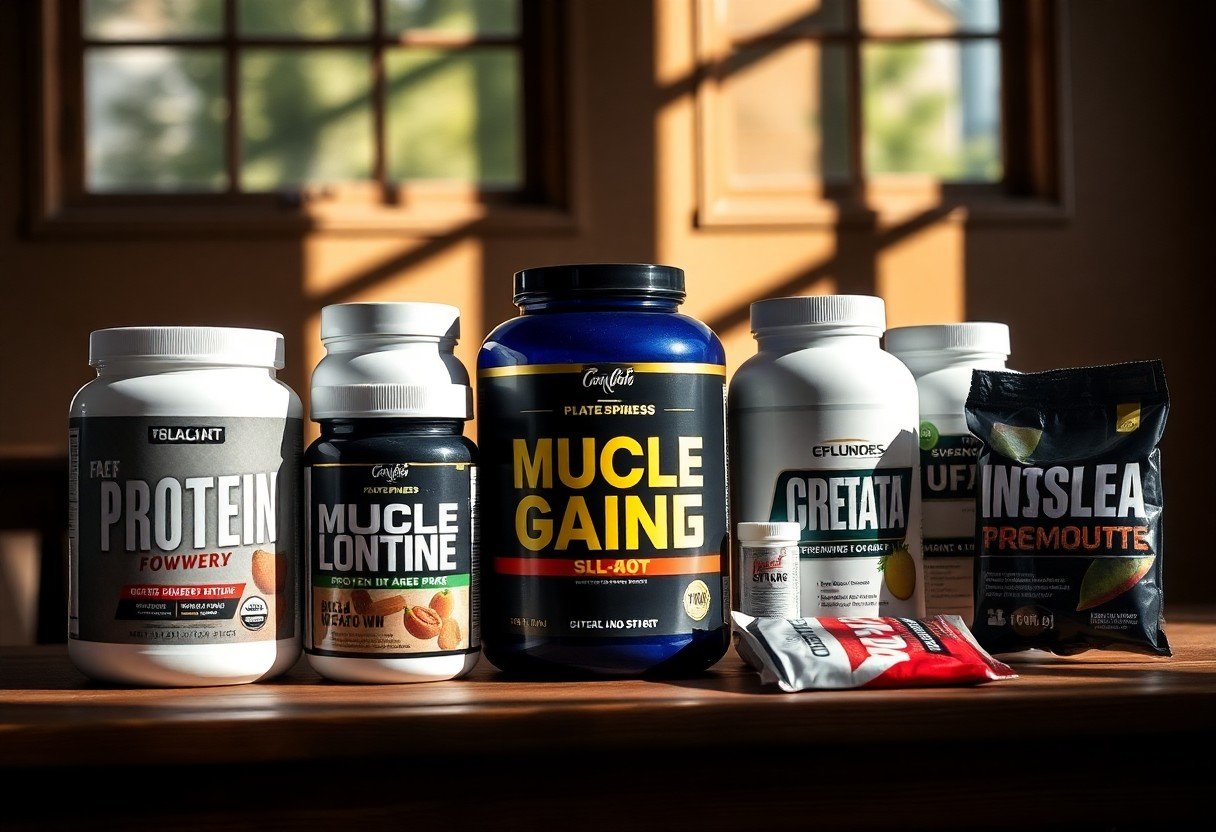Most likely, you are seeking effective ways to enhance your muscle gain in 2025. This guide will illuminate top supplements that can significantly boost your performance and results while addressing what doesn’t work or may even be potentially harmful. With the overwhelming array of products available, know which supplements deliver real benefits for your fitness goals and which to avoid to protect your health and maximize your training effectiveness.

Key Takeaways:
- Protein powder remains a staple, with innovative formulations enhancing absorption and effectiveness.
- Creatine continues to show significant benefits for muscle mass and performance, with potential new derivatives offering improved results.
- Beta-Alanine and BCAAs are gaining traction, but their effectiveness can vary based on individual training regimens and dietary habits.
Overview of Muscle Gain Supplements
Importance of Dietary Supplements in Muscle Building
Dietary supplements play a vital role in muscle building by providing your body with the necessary nutrients to optimize performance and recovery. Supplements can fill gaps in your diet, especially when insufficient caloric intake or nutrient absorption limits your progress. By leveraging the right products, you can enhance your training results and achieve your muscle gain goals more effectively.
Key Nutritional Needs for Muscle Growth
For optimal muscle growth, your body requires adequate protein, carbohydrates, and fats, along with vital vitamins and minerals. Protein is the building block of muscle tissue, while carbohydrates provide the energy necessary for intense workouts. Healthy fats support hormone production, which is important for recovery and growth.
To maximize muscle growth, aim for a daily protein intake of around 1.6 to 2.2 grams per kilogram of body weight, depending on your activity level. Carbohydrates should compose a significant portion of your caloric intake, ideally 45-65%, as they supply the energy required for your workouts. Healthy fats should make up about 20-35% of your total calories, contributing to hormone regulation and overall health. Balancing these macronutrients will create an anabolic environment conducive to muscle development.
The Science Behind Supplementation
The science of supplementation involves understanding how specific nutrients impact muscle protein synthesis and recovery. Taking supplements like protein and creatine can significantly enhance these processes, yielding better gains over time. Research supports that certain compounds can boost your workout performance, leading to increased muscle hypertrophy.
Studies indicate that consuming protein shortly after workouts can elevate muscle protein synthesis rates by approximately 50% compared to fasting states. Additionally, creatine supplementation has been shown to increase muscle mass by boosting the water content in muscle cells, leading to an anabolic environment conducive to growth. As you incorporate supplements into your routine, prioritize those backed by scientific evidence to ensure you’re making informed decisions about your muscle-building strategy.

Types of Supplements
- Protein Supplements – Essential for muscle recovery and growth.
- Creatine – Supports increased strength and explosive power.
- Branched-Chain Amino Acids (BCAAs) – Aid in reducing muscle soreness.
- Beta-Alanine – Enhances endurance and performance.
- Testosterone Boosters – Potentially increases muscle mass and energy levels.
| Supplement | Benefits |
| Protein Supplements | Promotes muscle repair and growth. |
| Creatine | Enhances strength and explosive performance. |
| BCAAs | Reduces muscle soreness and fatigue. |
| Beta-Alanine | Increases endurance and reduces fatigue. |
| Testosterone Boosters | Might improve muscle mass and energy levels. |
Protein Supplements
Protein supplements, such as whey and casein, are vital for maximizing muscle recovery and growth. They provide your body with the necessary amino acids to repair damaged muscle fibers after intense workouts. Incorporating protein supplements into your diet can help you meet your daily protein intake, facilitating better performance and faster recovery.
Creatine
Creatine serves as a popular supplement for increasing strength and muscle mass. It helps in regenerating ATP (adenosine triphosphate), the primary energy carrier in your muscles during high-intensity exercise. Regular creatine supplementation can lead to improved performance, enabling you to push through tougher workouts.
Many athletes find that creatine enhances their ability to exercise at higher intensities for longer durations. Studies have shown that creatine can lead to an increase in lean muscle mass and improved recovery times. Loading and maintenance phases are common strategies to maximize its benefits, with dosages typically ranging from 3-5 grams per day.
Branched-Chain Amino Acids (BCAAs)
BCAAs, including leucine, isoleucine, and valine, are necessary amino acids that help reduce muscle soreness and improve muscle recovery. Taking BCAA supplements before or after workouts can enhance exercise performance, enabling you to train harder and longer without experiencing excessive soreness.
Research supports the role of BCAAs in decreasing muscle damage during exercise and promoting faster recovery. They can also stimulate protein synthesis, which plays a significant role in muscle growth. This makes BCAAs a valuable addition to your supplement regimen, particularly in high-intensity training scenarios.
Beta-Alanine
Beta-alanine is renowned for its role in buffering acid in muscles, which can delay fatigue during anaerobic exercise. By supplementing with beta-alanine, you can enhance your endurance, allowing for more prolonged and effective workouts. This can contribute to improved overall muscle gain over time.
Beta-alanine supplementation typically provides noticeable improvements in performance during high-intensity activities. It works by increasing carnosine levels in muscle tissue, leading to enhanced buffering capacity. Regular use may result in significant gains in strength and endurance, particularly in activities lasting between 1 to 4 minutes.
Testosterone Boosters
Testosterone boosters are supplements aimed at increasing your body’s natural testosterone production, potentially leading to increased muscle mass and improved performance. Ingredients commonly found in these boosters include D-aspartic acid, fenugreek, and zinc, all of which can support hormonal balance.
Research has shown that a healthy level of testosterone is linked to muscle growth and strength. However, it’s necessary to approach testosterone boosters cautiously, as not all are backed by solid scientific evidence. A dietary and lifestyle approach, combined with responsible supplementation, may optimize testosterone levels naturally and enhance your muscle-gaining efforts.
Recognizing the importance of each type of supplement can help you make informed choices for your muscle gain journey.
Emerging Trends in 2025
Personalized Nutrition in Supplementation
In 2025, personalized nutrition is revolutionizing how you approach supplementation. Tailored supplements based on your genetic profile, lifestyle, and fitness goals are becoming more accessible, allowing for improved efficacy and better results. These customized blends consider individual nutrient needs, ensuring you get the most effective support for muscle gain.
Natural and Plant-Based Options
The trend towards natural and plant-based supplements is gaining momentum. You’re likely to find an increase in available products derived from organic sources, which offer beneficial compounds without synthetic additives. These options cater to a growing demand for cleaner, effective muscle support alternatives.
Emerging evidence highlights the effectiveness of plant-derived proteins, like pea and hemp, which not only provide necessary amino acids but are also easier on digestion. Additionally, adaptogenic herbs such as ashwagandha and maca are becoming popular for enhancing recovery and reducing stress, thus complementing your muscle-building efforts.
Advances in Supplement Technology
Technological innovations are shaping the supplement landscape, with advanced delivery methods such as microencapsulation and time-release formulations. These technologies enhance the bioavailability of nutrients, allowing you to absorb more efficiently and maximize the impact of your muscle gain regimen.
With ongoing research, companies are using nanotechnology to create particle-sized supplements that improve absorption rates significantly. This means you can expect faster results from the same dosage, optimizing your training outcomes and improving muscle recovery times.
The Rise of Smart Supplements
Smart supplements, which incorporate cognitive enhancers and adaptogens, are becoming increasingly popular. These formulations not only support your physical performance but also boost your mental focus, enhancing your overall workout experience.
By combining nootropics with traditional muscle-building ingredients, smart supplements help you stay mentally sharp and driven during workouts. This integrated approach is particularly beneficial for those who juggle intense training with other responsibilities, ensuring you can perform at your best both physically and mentally.

Evaluating Effectiveness
Research Evidence and Studies
When assessing supplements for muscle gain, you should turn to peer-reviewed studies that evaluate their efficacy. Research findings, such as those from the Journal of Strength and Conditioning Research, consistently demonstrate that protein supplementation may enhance muscle growth, especially when combined with resistance training. Moreover, a meta-analysis published in Sports Medicine found creatine to be effective in increasing strength and lean body mass across multiple trials, indicating its reliability for enhancing workout performance.
Assessment of Popular Brands
In your quest for effective supplements, evaluating popular brands is imperative. Many brands claim to offer high-quality products, but not all live up to their promises. Look for supplements that have undergone third-party testing for purity and effectiveness, as this can give you confidence in their claims.
Consider brands like Optimum Nutrition and BSN, which are frequently backed by solid research and positive user reviews. It’s important to analyze ingredient quality and sourcing; for instance, transparent labels and comprehensive ingredient lists indicate trustworthiness. Additionally, consumer feedback can highlight potential issues like digestive upset or insufficient results, helping you make an informed choice.
Myths and Misconceptions
Numerous myths surround muscle gain supplements that can mislead you. For example, many believe that taking excessive amounts of protein will automatically lead to more muscle growth. Evidence suggests that your body can only utilize a certain amount effectively, and excess may be stored as fat rather than muscle. Understanding these misconceptions allows for a more scientific approach to supplement use.
Myth-busting is vital in your supplemental journey. The idea that all natural supplements are safe is deceptive; some may interact with medications or cause side effects. It’s imperative to discern proven benefits from marketing hype. Knowledge of the actual science behind supplements will empower you to make informed decisions for your muscle gain goals.
Potential Risks and Side Effects
Common Side Effects of Supplements
You may experience a range of common side effects when using muscle gain supplements, including digestive issues like bloating or diarrhea, increased heart rate, or insomnia, especially with stimulants. Creatine, while effective, can also lead to water retention, which may affect your appearance and overall comfort during workouts.
Interactions with Medications
Always consider interactions with medications when using supplements. Certain substances can amplify or counteract the effects of prescription drugs. For instance, taking creatine alongside diuretics can increase the risk of dehydration, impacting your performance and health.
Moreover, supplements like St. John’s Wort can interfere with medications for anxiety or depression, leading to reduced efficacy. If you’re on blood thinners or medications for diabetes, certain amino acids and fish oil can either heighten or diminish your medication’s effects. Always consult a healthcare professional before combining supplements with your current medications to avoid adverse reactions.
Long-Term Health Considerations
Using supplements over the long term can come with significant health considerations. While they boost muscle gain, excessive usage might lead to adverse effects on kidney function, hormonal imbalances, or nutrient deficiencies.
For instance, prolonged consumption of high protein supplements can strain your kidneys, especially if you have pre-existing conditions. Regularly using anabolic steroids for muscle gain can disrupt natural hormone production, leading to long-term side effects like infertility, cardiovascular issues, or liver damage. Ensuring you cycle supplements correctly and monitor your body’s responses is vital for maintaining long-term health.
Choosing the Right Supplements for You
Factors to Consider Before Supplementing
Before you start using any muscle gain supplements, evaluate several key factors. Consider your diet, training routine, and any underlying health conditions. Identify your specific goals, such as weight gain or enhancing strength, as this will guide your choices. Always check for trusted, evidence-based sources and product quality. Ingredient transparency is vital. Assume that understanding these elements will lead to more effective results in your muscle-building journey.
Consulting with Healthcare Professionals
Consulting a healthcare professional is important when considering supplements. This step ensures you’re making informed choices tailored to your health status and fitness goals. Experts can help evaluate your nutrition, identify any nutrient deficiencies, and suggest safe, effective supplement options.
Tailoring Supplements to Individual Goals
Your supplement strategy should align with your unique objectives. Whether you’re aiming for lean muscle mass, improved recovery, or increased strength, select supplements that support these targets. Tailoring your regimen can enhance effectiveness and maximize gains while minimizing unnecessary intake.
Conclusion
Presently, understanding the effectiveness of supplements for muscle gain in 2025 empowers you to make informed choices. Focus on those with solid scientific backing, such as protein powders, creatine, and branched-chain amino acids, while being cautious of trends that lack research. Tailoring your supplementation to your specific goals and body response will optimize your results. Stay informed about what works and what doesn’t, allowing you to enhance your muscle-building regimen effectively.
FAQ
Q: What are the most effective supplements for muscle gain in 2025?
A: The most effective supplements for muscle gain in 2025 include creatine monohydrate, branched-chain amino acids (BCAAs), whey protein, beta-alanine, and HMB (beta-hydroxy beta-methylbutyrate). These have shown consistent results in supporting muscle hypertrophy and recovery.
Q: How does creatine work for muscle gain?
A: Creatine helps increase the availability of ATP, the energy currency of cells, which allows for enhanced performance during high-intensity exercise. This leads to increased training volume and muscle adaptation over time.
Q: Are plant-based protein supplements effective for muscle growth in 2025?
A: Yes, plant-based protein supplements, such as pea protein and brown rice protein, have gained popularity and can support muscle growth effectively. Combining different plant proteins can ensure a complete amino acid profile, similar to whey.
Q: What role do BCAAs play in muscle recovery?
A: BCAAs, especially leucine, stimulate muscle protein synthesis and reduce muscle soreness post-exercise. They can improve recovery times and support muscle growth, making them beneficial for athletes and gym-goers.
Q: Are there any supplements that don’t work for muscle gain?
A: Some supplements, like testosterone boosters and certain fat burners, often lack solid scientific backing for muscle gain. It’s imperative to focus on well-researched options and consult a professional before trying unverified supplements.










